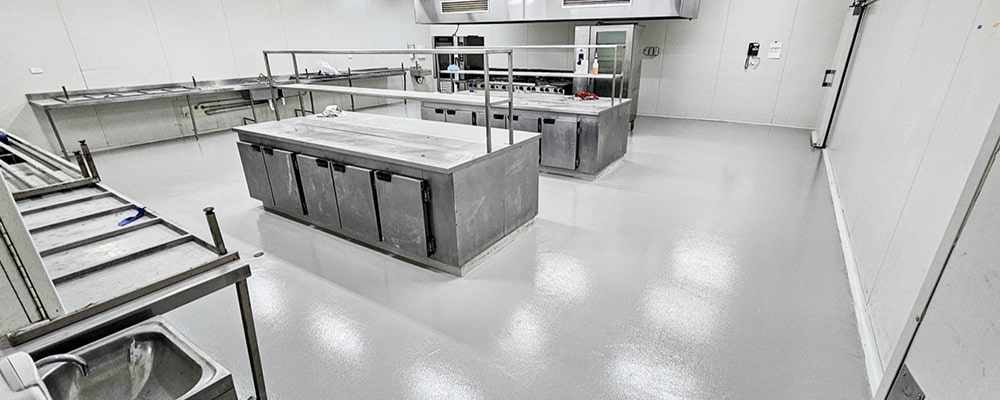What type of Flooring is Best for Commercial Kitchens?
- Home
- ..
- Blog

When it comes to outfitting a commercial kitchen, selecting the best food grade flooring is a decision that should be well-considered. Constant spills and chemical cleaning, heavy foot traffic, exposure to heat, moisture and grease mean that durability, safety, hygiene and the practicalities of installation and repair are all considerations for commercial kitchen owners when selecting the best flooring for their space.
There are many options available for commercial kitchen flooring, each with distinct advantages and disadvantages- vinyl, tiles and epoxy flooring to name a few. Let’s further explore these and explain why epoxy flooring stands out as the unmatched choice for commercial kitchen flooring.
Ceramic tiles are a common choice for commercial kitchen flooring because of their durability and resistance to moisture and heat. They come in endless designs and colours which allows for customisation to match the styling of the restaurant or venue. Tiles are also relatively easy to clean and come in matte and non-slip options, so they meet the basic requirements for food production flooring. Despite their durability, ceramic tiles do have a tendency to crack or chip under impact, potentially creating areas where bacteria can thrive if not properly repaired or sealed, creating an ongoing maintenance issue.
Another very common flooring choice for commercial kitchens is vinyl. Easy installation, an abundance of designs and colours and affordable pricing combined with resistance to water, grease and staining make this an attractive option. However, while most vinyls have some durability, this product is very susceptible to wear, can tear easily and is known to lift at the joins over time. This means it needs replacing more regularly than other options to remain hygienic and prevent trip hazards.
Polyurethane (epoxy) flooring is a professional food grade flooring choice for restaurants and food production facilities looking for a high standard in food hygiene production. Its composition, high quality and anti-bacterial features make it ideal for commercial kitchens, restaurant flooring and food production settings. It’s unmatched durability, sanitation benefits, heat resistance, anti-slip qualities, aesthetic appeal and longevity make epoxy flooring the go-to for anyone looking for a low-maintenance option that ticks all the boxes.
Epoxy flooring is applied directly to the concrete substructure, creating a non-porous surface that is impervious to water, grease, and chemicals. Its seamless nature eliminates the need for joins or grout which can trap dirt and grease and harbour bacteria.
The foremost advantage of epoxy flooring is its incomparable durability. Installed correctly, it can withstand heavy impact, scratches, and abrasions- making it ideal for the high traffic environment of a commercial kitchen. Unlike ceramic tiles and vinyl flooring, which may need frequent repairs or replacements, epoxy flooring is designed to last for many years with very minimal maintenance.
Safecoat Flooring can provide straightforward installation. Epoxy flooring sets as a solid, seamless floor coating that can be applied directly to concrete. Most impressively, it dries in as little as 24 hours! It’s flawless appearance and seamless design, make it easily maintained and simple to clean and it won’t wear down over time.
Limitless designs, features and colour options are offered by Safecoat team. The clean, professional shine of epoxy food grade flooring has fast become the first choice for commercial kitchen owners that require a clean, safe food production environment, minimal downtime for installation and a fantastic aesthetic.
While alternative options have their merits, epoxy flooring is the superior choice for commercial kitchen flooring in Melbourne restaurants. The unmatched benefits make it the ideal solution for busy kitchen environments where cleanliness and efficiency are of the utmost importance. By investing in epoxy flooring, kitchen owners can be assured that their floors will withstand the rigor of daily use. Contact Safecoat to find out more information or how we can transform your kitchen floors.